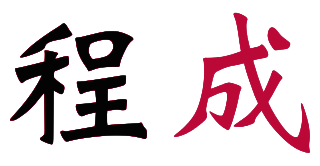As a surname, Loh may refer to:
As a surname, Loh may refer to:

Cheng can be a transcription of one of several Chinese surnames. Since the syllable Cheng represents different sounds in Hanyu pinyin and the Wade–Giles systems of Chinese romanization, some ambiguity will exist as to which sound is represented by the letters "Cheng" if the romanisation and tone is not known. Also within each system of romanisation, each syllable can represent one of several different characters, as with any Chinese syllable.
Luo may refer to:
Luo or Lo refers to the Mandarin romanizations of the Chinese surnames 羅 and 駱. Of the two surnames, wikt:罗 is much more common among Chinese people. According to the Cantonese pronunciation, it can also refer to 盧.
Chun may refer to:
Longshan may refer to a number of places in mainland China and Taiwan. It may also infrequently refer to another Mount Long which is used as an abbreviation for Gansu. Both may also be referred to by the former romanization Lung-shan.
Chan is a non-pinyin romanisation of multiple Chinese surnames, based on different varieties of Chinese.
The romanisation of the Chinese language in Singapore is not dictated by a single policy, nor is its policy implementation consistent, as the local Chinese community is composed of a myriad of topolect groups. Although Hanyu Pinyin is adopted as the preferred romanisation system for Mandarin and the standard of Chinese education, the general lack of a romanisation standard for other Chinese varieties results in some level of inconsistency. This may be illustrated by the many variants for the same Chinese characters often found in surnames such as Low, Loh, Lo; Tay, Teh; Teo, Teoh; Yong, Yeong.
Lai is a common Chinese surname that is pronounced similarly in both Mandarin and Hakka dialects. The meaning of the character used in the Lai (賴) surname is "depend on; trust in; rely on". Conversely the words, 無賴 literally translated to "without Lai" which means "undependable, rascal or scoundrel".
Shao is a common Chinese family name. It is the 86th most populous family name in China. It corresponds to last name So in Korean; "Thiệu" or "Thiều" in Vietnamese; “Zau” in Wu Chinese/Shanghainese and Siu, Chow, or Sho in other Chinese romanisations. The origin of the family name Shao is thought to have come from the royal lines of the Zhou Dynasty in ancient China. The King's loyal subject Duke of Shao (召公), was thought to have originated the Shao lines.
Yu is the pinyin romanisation of several Chinese family names. However, in the Wade–Giles romanisation system, Yu is equivalent to You in pinyin. "Yu" may represent many different Chinese characters, including 余, 于, 由, 魚 (鱼), 漁(渔), 楀, 俞(兪), 喻, 於, 遇, 虞, 郁, 尉, 禹, 游, 尤, 庾, 娛(娱), and 茹 (Rú).
Liao is a Chinese surname, most commonly found in Taiwan and Southern China. Statistics show it is among the 100 most common surnames in mainland China; figures from the Ministry of Public Security showed it to be the 61st most common surname, shared by around 4.2 million Chinese citizens.

Radical 167 or radical gold (金部) meaning "gold" or "metal" is one of the 9 Kangxi radicals composed of 8 strokes. It also represents the Chinese family name, Jin, which is No. 29[1] of the Hundred Family Surnames.
Hung is a non-pinyin romanisation of multiple Chinese surnames, based on different varieties of Chinese.
As a surname, Chong may refer to:
Tou is a surname in various cultures.
Tong is a Chinese surname. Tong as transcribed in English however represents of a number of different Chinese surnames.
Luò is a Chinese surname, also known as Lo in Wade-Giles romanization It is pronounced Loc, Lock, Lok or Locke in Cantonese.

Ben is a Chinese surname meaning "bright, energetic". It is romanized Pên in Wade–Giles, or Ban in Cantonese romanization. According to a 2013 study, it was not one of the top 400 surnames in modern China. It is the 179th name on the Hundred Family Surnames poem.
Nong is a Chinese surname meaning "farmer". It is romanized Nung in Wade–Giles or Cantonese romanization. According to a 2013 study, it was the 189th most common name in China; it was shared by 640,000 people, or 0.047% of the population, with the surname being most common in Guangxi. It is the 320th name in the Hundred Family Surnames poem.